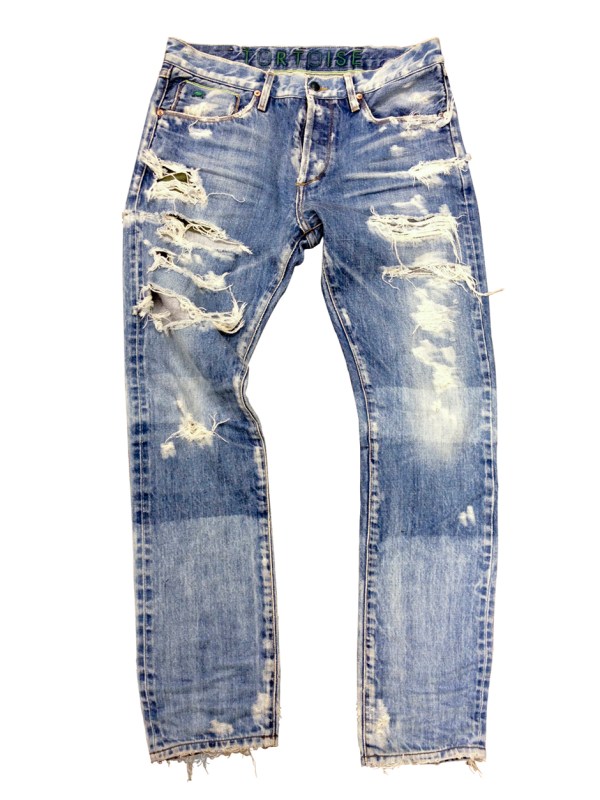One doesn’t need to be a denim expert to know that the last several years have been cruel to the denim industry. An oversupply of skinny fits, colored denim, an aging population and surging demand for heritage-looking menswear sent many a brand packing and tailored sportswear into the black.
Now help is on the way in the form of one California brand, whose obsession with sustainable laundering is showing how blue denim might be poised for a major comeback. Debuting this fall, Tortoise Jeans just might have the best washes and finishes of all its peers, but the brand isn’t stopping there. It’s aiming to create the industry standard of the future, with the most sustainable denim laundry in the US (dubbed ECO-PRK) and the company’s proprietary Wiser Wash methodology to reduce the industry’s environmental footprint.
Included, for example, is a patent-pending application of ozone, designed to bleach yet cut out toxic chemicals in doing so; a locally sourced ingredient that eliminates stonewashing and the need for materials such as pumice stone that produce sludge; and a robust water treatment system that uses 80% less water and recycles it in a 1:1 ratio.
“You can achieve a very cool fashion-forward look or authentic look without drawing on harmful processes traditionally associated with washing jeans,” insists Tortoise Jeans co-founder Lukus Eichmann, whose background includes designing and developing denim for companies such as Opening Ceremony, Haute Hippie and Rogan Jeans. (Business partner Kevin Youn is equally the veteran, having spent 12 years at Koos Manufacturing.)
Indeed washes like the vintage-looking 1015, made with ozone; the 1005, made without any kind of traditional stonewashing techniques; the painterly-looking 1009, colored by hand so as to produce richer color variations; and the marbled-looking 1012 are all stunning, incredibly lightweight and soft. For those in search of something even more handcrafted, there’s the Cheyls fit and Kinixys jacket, made with camo jacquard patches coated with an Italian wax additive designed to wear over time to a rugged, natural-looking indigo.
The items come at a price: jeans average $365 while jackets come in at $425. Eichmann puts it all into perspective, however, when he explains that unlike most brands, Tortoise Jeans uses locally sourced materials—that is, dead stock, ends of rolls or discarded quantities from bigger factories. In doing so, it cuts out the demand for custom-ordered fabrics that often requires water-intensive and other not so ecologically friendly processes. In turn, each limited batch might use the same wash process or formula, but it is unlikely that the consumer will ever see the same garment again because of the limited quantity Tortoise Jeans has to begin with. Each pair then has a different wash, rip and color variation and everything is cut, sewn and washed in Los Angeles.
Eichmann hopes ECO-PRK might one day become the kind of model facility where people can go to learn more about sustainability. For now, though, slow and steady, like the tortoise that inspires the brand’s slow philosophy, suits the brand fine. Asked whether the capsule line will expand for spring, Eichmann explains, “It will, when it’s the right time for the company. But at the moment, our strength is in producing the best denim in terms of how we wash it and the materials that we use. We don’t want to lose sight of that.”
Available at Ron Herman, Atrium, Machus and, for holiday, American Rag.







